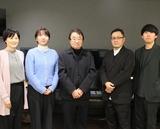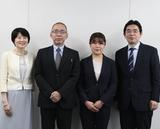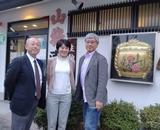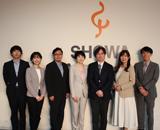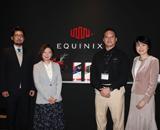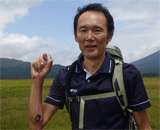September 2018
The Gold Standard Bearer of Japan's Alpine Skiing World: Kentaro Minagawa Talks about the Business Outlook of Top Athletes
For this edition of funNOTE, we interviewed highly accomplished Japanese alpine skier Kentaro Minagawa. He is particularly noteworthy for his tremendous feat at the 2006 Turin Olympic Winter Games which was groundbreaking for Japanese alpine skiers (finishing fourth in the slalom competition), as well as his subsequent contributions to the skiing world and success as a businessperson. In this interview we would like to share with you all the shining details about Mr. Minagawa.
Former Arc Communications Ski Team member Yu Yoneya (ski halfpipe) was also on hand for what developed into a broad, open-minded conversation about the second careers of top athletes. What type of business do top athletes think about? How do they go about achieving success in the business world too? This conversation provided a number of tips and clues to help us learn about these things and more.
From left to right:
Mariko Ohsato, Kentaro Minagawa and Yu Yoneya
- Profile
- Kentaro Minagawa: Executive Director, General Manager of Games Division, Ski Association of Japan
- Yu Yoneya: Translation Services and Marketing, Arc Communications Inc. Former member of the Japanese National Freestyle Ski Team in the Halfpipe event
- Mariko Ohsato: CEO & President, Arc Communications Inc.
Results Come Tumbling Into Place
Ohsato: The first thing I would like to ask you about in this interview is how your mental state was in the second run of the Alpine Skiing Men's Slalom finals at the 2006 Turin Olympics. You were in third after the first run. For a number of years, I had wanted to ask you in person what you were thinking at that moment, with the medal on the line.
Minagawa: I started skiing when I was three years old, and stopped competing when I was 37. In all those years as a skier, Turin was the tensest competition I experienced. That's because after the first run I was only 0.07 seconds behind the leader, so even the gold medal was within my reach. There were two and a half hours of waiting between the first and second run, and looking back now I feel that those hours were precious to me. In the waiting room I hardly spoke with anyone. I ate some food and checked my pulse, but my mind was elsewhere. But when that's the case, I just end up thinking in cycles, pondering the negatives and the positives back and forth, over and over again.
In my event (Slalom), everything is decided in less than a minute. So outside of that time you have to use up as little of your concentration as possible. In other words, you have to make an effort not to concentrate. For example, if you think to yourself "I can do it!" or something like that, you just use up that much concentration. That's inefficient, so I tried to pass the time doing as little of that type of thinking as possible.
Ohsato: So then what do you think about at times like that?
Minagawa: Music is very important to me. During those hours, and during the opening and closing ceremonies also, I was constantly listening to a song by opera singer Andrea Bocelli. He sang a duet with British singer Sarah Brightman called "Time to Say Goodbye." It was a huge hit, and I was always listening to the original version of that song. I don't have to think too much when I'm listening to music.
Still, I remember that when there were only 10 minutes left until starting time, sure enough my tension started to rise. There were only two skiers who had their turns after mine on the second run, so if I could beat those two I would take the gold medal. But what I was thinking then wasn't to go all out, but rather to "just go 80%." In my case, I always think that things ultimately just tumble into place. So in this case I thought rather than pushing myself to go hard and capture a result, I could ski with 80% effort and take the numbers that tumble into place.
Ohsato: Then you ran into trouble, but you still took fourth.
Minagawa: There were a total of about 68 turns on the second run, but my buckle actually came off during the first 10. At the time, I wasn't thinking to myself that my buckle had come off. But I did feel that something wasn't right, so I put off the more intense turns until later in the race, and went with a less aggressive strategy. That's something I couldn't have done if I were just skiing as hard as I could, at 100%. If I'm not skiing at 80%, I can't make adjustments or compensate for things. In that sense, I feel like I had a good race.
The Money Is Not for You, It's for the People
Ohsato: It goes without saying that you have had a stellar career as a competitive skier, but now we would like to shine the spotlight on you as a businessperson. First off, were there any episodes where someone you met when you were younger set you on the path to your career today?
Minagawa: The first person to ever take a shine to me was the former owner of Seibu Railway, Yoshiaki Tsutsumi. The inn that my father started was in the Naeba Ski Resort (which was owned by an affiliate of Seibu Railway), and I could always hear my father saying, "Yoshiaki Tsutsumi is an amazing person." Then, around when I was a fifth or sixth grader in elementary school, I happened to actually meet him. While I was skiing in Naeba, a local patrol person I know introduced me to Mr. Tsutsumi who happened to be visiting the area, and told him: "This kid is from Naeba. He's working hard at skiing, and wants to be in the Olympics." Later, when I was a third-year student in junior high and on the Japanese national team I met Mr. Tsutsumi again, this time at a party. When I greeted him, he told me, "You've really grown, haven't you?" From that connection, it became strongly etched into my mind that it's because Mr. Tsutsumi built that ski resort that I have become the person I am today.
I also met another important person around when I was a first or second year student in junior high. Hideo Morita (the eldest son of Akio Morita, founder of Sony) was going to build a ski resort called Arai Resort in Myoko, in Niigata Prefecture, and there was talk of starting a skier training group along with a club team. Right around then I was skiing as a forerunner for a local ski competition, and a foreigner who was the club team coach saw me ski and said, "This kid is good." From that point up until when I was about 22, the team gave me continuous support.
Mr. Morita also supported me in various ways, and looking back now, I would say that all this provided me with a number of experiences that wound up leading to business. I had only ever worn school uniforms, but he bought me clothes and took me to parties. He also gave me money every month, and told me, "This money is meant to be spent for people, not for yourself." Even though I was an elementary school student, I was treating my friends to meals at the ski resort (Laughs). I think this was also one of his educational methods.
Feature Interview Index

